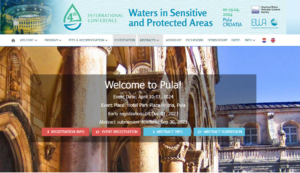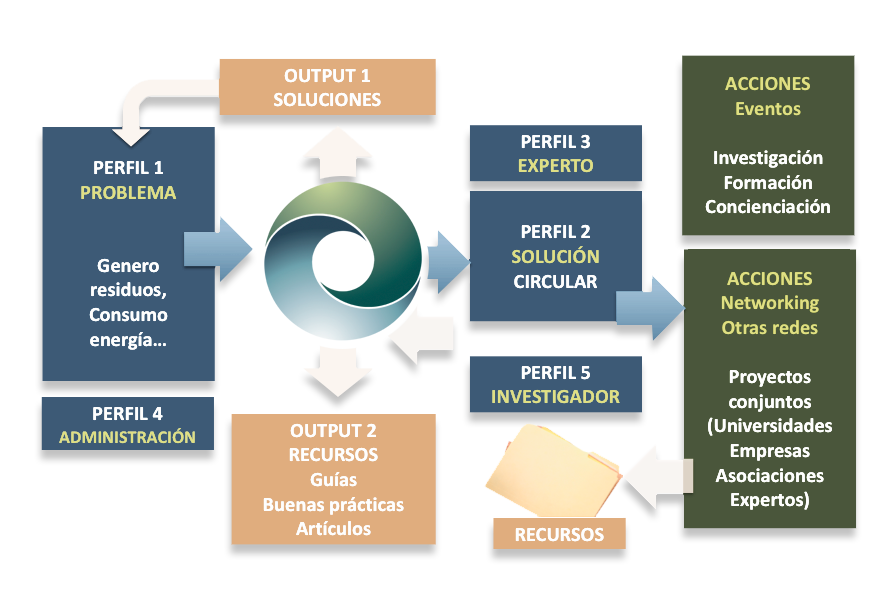JOIN the RECIS Network!
- 4th International Conference WATERS IN SENSITIVE AND PROTECTED AREAS

- 4th International Conference WATERS IN SENSITIVE AND PROTECTED AREAS

- 4th International Conference WATERS IN SENSITIVE AND PROTECTED AREAS

- 4th International Conference WATERS IN SENSITIVE AND PROTECTED AREAS

Upcoming events

The Circular Economy Network in Islands (RECIS) is a non-profit association based on the island of Gran Canaria, whose purpose is the study and dissemination of circular economy solutions to the problems of scarcity of resources and environmental fragility that the development of island territories presents.
It will also be the engine of dissemination and promotion of the Circular Economy in islands and will also be in charge of ensuring good practices and sustainability. This Network must accommodate different profiles since many of the problems that are generated require multidisciplinary solutions.
WHAT IS THE CIRCULAR ECONOMY?
The Circular economy is a new economic model: a new way of understanding the way we produce and consume in the economy. Until now, the economy has followed a linear model according to the scheme: extract resources produce consume and throw away. This scheme has subjected the environment to unsustainable pressure both due to the exploitation of natural resources and the amount of waste we generate. As an alternative, the circular economy model supposes a new way of producing and consuming in which the use of resources is minimized and waste is transformed into new resources that are used again in the production chain. This requires a change in mindset, rethinking and redesigning the way we produce and consume. The 7Rs of the circular economy include: Rethink, Redesign, Reuse, Repair, Remanufacture, Recycle and Recover. The existence of European, national and regional circular economy plans or strategies show that the circular economy is not a passing fad or a new way of calling old concepts. It is something that has come to stay and that will change our economic development model and even our way of thinking.
ASSOCIATION PROFILES
Profile 1: problem generation (waste generation, energy consumption, among others)
Profile 2: circular solutions with companies or institutions that manage these resources
Profile 3: experts who provide their opinions and solutions (legal, logistics management, etc.)
Profile 4: public administration as they can be an important part of the solution
Profile 5: researchers who will be able to develop new methodologies
Size Matters. To detect problems and propose solutions, it is important to have a sufficiently large size. Certain problems go undetected by assuming they affect only a few. Certain solutions are only available for large-scale application. This leap from micro to macro requires associating and sharing information.
You are interested in RECIS if you want to start walking towards the circular economy and do not want to do it alone. Networking allows you to share problems and solutions so that:
- Problems common to all companies in the same sector are identified. Sharing problems to detect where the main points of interest are is the first step in addressing solutions.
- By working in a multidisciplinary way, it is possible to find solutions where they would not normally be found. It is possible that the solution we are looking for is already being applied by other companies or in other sectors.
- By increasing the scale of work, it is possible to apply group solutions instead of individual ones. Commonly available solutions to many problems are only designed to be applied on a scale much larger than the size of the companies on the islands.
- Networking allows the actions generated to have a greater social impact. The possibility of communicating and raising awareness is greater if it is done on a larger scale.
The islands, due to their remoteness, their small size and their environmental fragility, are amplifying the problems of scarcity of resources and waste management that affect the world on a global scale. The smaller size can prevent solutions thought for a larger scale from being applied, which makes it necessary to rethink and rescale the possible solutions. Islands can be a unique laboratory for experimenting with local solutions on a small scale.
OBJECTIVES
Among the objectives of RECIS network are:
- Study forms of energy generation based on renewable sources and propose areas of application of them.
- Study the problems of waste generation and propose management solutions based on the principles of the circular economy.
- Propose business management systems that minimize both the use of resources and the generation of waste, and that generate positive impacts on the nearby environment.
- Promote associations and networking for the study and development of initiatives based on the circular economy.
- Generate and disseminate knowledge about the best practical experiences of circular economy through the publication of articles, reports, good practice guides, etc.
- Disseminate the principles of the circular economy through the organization and participation in courses, forums, events, conferences, congresses, etc.
- Promote the development of basic and applied research in circular economy, bioeconomy and eco-design for the solution of specific problems in areas of special relevance for the development of island territories.
- Create and develop a multidisciplinary work network that facilitates the search and application of solutions based on the circular economy.
- Any other action that allows generating awareness of social change with regenerative effects on the environment.
Until recently, reducing both resource consumption and waste generation was a matter of individual conscience and commitment. In the immediate future, Governments will begin to require the adoption of solutions based on the circular economy. Integration into the RECIS network allows you to start adapting to these changes.
Joining RECIS and sharing information will allow you to:
- Know the problems of the sector through the exchange of experiences.
- Know inspiring ideas and ways in which others have already solved your same problems.
- Find joint solutions to common problems that have not yet been solved.
- Access collective solutions that would hardly be achievable on an individual level.
- Contact companies that offer solutions to your problems.
- Access documents, information, guides to good practices and sector analyzes.
- Access experts that would be difficult for you to access individually.
- Participate in forums and events that contribute to generating an awareness of social change.
- Stay informed of news and developments in the circular economy.
RECIS assumes the following commitment with its associates:
- Integrate them into the network and give them access to information (news, sectoral analysis, studies, documents, etc.) generated by the NETWORK itself.
- Integrate them into a distribution list to keep them informed of the news, activities or results of the NETWORK.
- Manage all the information provided confidentially. The results of the analyzes and studies will always be disseminated in an aggregate way, without ever identifying a specific company (unless, expressly, it wishes to be advertised).
- Invite participation in all sectoral or general conferences, events and meetings on circular economy organized from RECIS.
- Facilitate access to contacts through the network and the search for experts among members of the network or in other similar networks.

